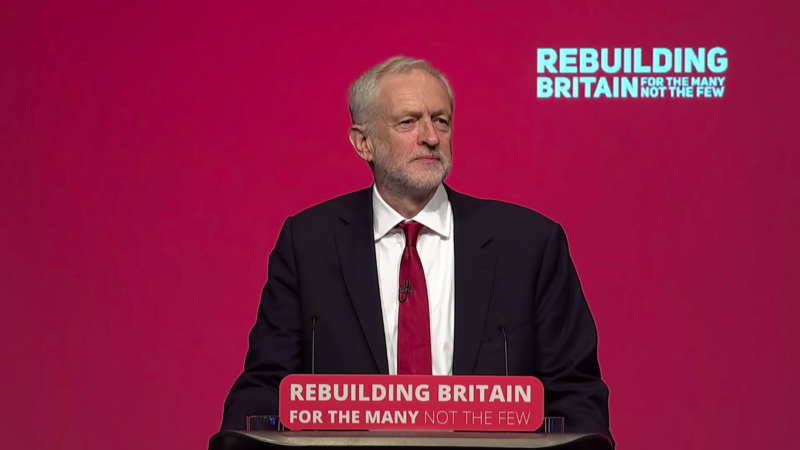
With the new Brexit deadline just days away and no agreement yet reached on a way forward, the Prime Minister has invited the Labour Party for talks with the aim of negotiating a deal that can command the support of a majority of MPs. In a video address to the country released over the weekend, Theresa May cited three Brexit aims that both parties agree on: to leave with a good deal; to protect the economy and jobs; to end freedom of movement.
Although the signs had been clear for some time, many Labour members expressed disappointment when it was confirmed last week that party policy is still to end freedom of movement once the UK leaves the EU. It was a manifesto pledge in 2017, and Labour reaffirmed its view that Brexit must involve ending free movement during the debate on the Immigration and Social Security Coordination Bill in parliament – but activists had hoped that Labour under Jeremy Corbyn would put forward a radical pro-migration agenda.
Optimists often point to the leadership’s past credentials – Jeremy Corbyn, John McDonnell and Diane Abbott all have long records of migrants’ rights activism. They contend that this would be reflected by the policies of a Labour government, if not those of Labour in opposition. However, without strong commitment from grassroots campaigners to challenge the leadership on their policy positions, there is little to suggest that any radical policy shift will occur, no matter what happens with Brexit.
In the 2017 manifesto, Labour advocated for a new, skills-based immigration system reflecting the needs of the British economy. Working with trade unions and industry, a Labour government would take into account skills shortages and offer a route into the country based on measures such as employer sponsorship, work permits and visa regulations. For those of us familiar with the government’s immigration white paper, it’s difficult to spot any substantial difference between the skills-based immigration policy of the Conservative Party and that of Labour.
Tying someone’s rights to live in a country to their employer can open the door to more, not less, exploitation. Migrant workers will be reluctant to stand up to their employers, join a union and participate in strikes if they fear repercussions and their right to stay in this country is dependent on their job. A skills-based, visa-coupled system is therefore no good alternative to free movement.
The last Labour manifesto did promise to end indefinite detention and close notorious detention centres like Yarl’s Wood, which was welcome. But a commitment to closing all detention centres was notably absent. This is because the leadership will be well aware that any form of “management” of immigration will inevitably require a system of rules and criteria migrants have to follow, accompanied by controls and checks to ensure compliance, eventually resulting in removal of those who do not comply. Managed migration is incompatible with the demand to end all detentions and deportations.
Labour’s promise to end free movement whilst putting forward a new system that does little to level up non-EU and EU migrants’ rights will disappoint both pro-migrant Lexiteers and Remain supporters. Migrants rights’ campaigners in Labour can’t be blindsided by the Brexit infighting – they need to stay focused on what’s at stake.
To allow Corbyn to enact a truly transformative programme in parliament and in Downing Street, activists must lay the groundwork. Cautiously dodging difficult questions for fear of being too critical of the leadership will only result in more triangulation. And we need to be prepared for this not only being true on immigration, but many other potentially controversial areas such as policing, foreign policy or the environment, where Corbyn’s Labour should be championing a radical approach.
We cannot simply rely on the leadership’s past record. Corbyn and Abbott don’t need cheerleaders – they need comrades who can keep them on the straight and narrow while they are under huge pressure. As party leaders, Corbyn and Abbott are in a very different, and much more difficult, situation. The dissonance between their radical past and their political actions might only grow if Labour wins power. Corbyn and his team will have to square their own beliefs with grassroot activist demands, the Labour Party ‘broad church’ and the general public.
If the Corbyn project wants to succeed in being truly transformative, our demands must be braver and bolder. Rather than accept the narrative of the right, which tells us that Brexit means ending free movement and managing immigration, Labour’s message must stay focused on solidarity between all workers against exploitative bosses. Rather than adopt skills-based approaches, Labour should commit to keeping free movement and developing policies that can elevate other groups to the same level. Rather than subject Europeans to the hostile environment, why not lift more migrants out of it? We could campaign to reinstate free movement between all Commonwealth countries, for a start.
As the Brexit deadline approaches, we can finally notice a shift in discussions within Labour, as some who were quieter on the free movement question in the past are now starting to change their approach and call on the leadership to think again. There is still hope that the argument for a different kind of immigration policy can be developed and won.




More from LabourList
Labour place third in Gorton and Denton by-election as Greens gain seat
‘What Batley and Spen taught me about standing up to divisive politics’
‘Security in the 21st century means more than just defence’